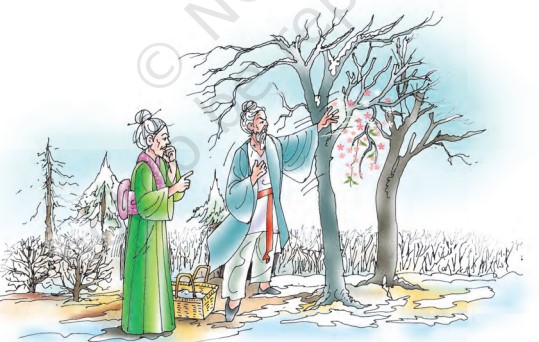The Ashes that Made trees bloom - B
Not long after that, the good old man dreamed again, and the spirit of the dog spoke to him, telling him how the wicked people had burned the mill made from the pine tree. “Take the ashes of the mill, sprinkle them on the withered trees, and they will bloom again,” said the dog-spirit.
The old man awoke and went at once to his wicked neighbour’s house, where he found the miserable old pair sitting at the edge of their square fireplace, in the middle of the floor, smoking and spinning. From time to time they warmed their hands and feet with the blaze from some bits of the mill, while behind them lay a pile of the broken pieces.
The good old man humbly asked for the ashes. Though the covetous couple turned up their noses at him and scolded him as if he were a thief, they let him fill his basket with the ashes.
On coming home, the old man took his wife into the garden. It being winter, their favourite cherry tree was bare. He sprinkled a pinch of ashes on it, and, lo! it sprouted blossoms until it became a cloud of pink blooms which perfumed the air. The news of this filled the village, and everyone ran out to see the wonder.
The covetous couple also heard the story, and, gathering up the remaining ashes of the mill, kept them to make withered trees blossom.
The kind old man, hearing that his lord, the daimio, was to pass along the high road near the village, set out to see him, taking his basket of ashes. As the train approached, he climbed up into an old withered cherry tree that stood by the wayside.
Now, in the days of the daimios, it was the custom, when their lord passed by, for all the loyal people to shut up their high windows. They even pasted them fast with a slip of paper, so as not to commit the impertinence of looking down on his lordship. All the people along the road would fall upon their hands and knees and remain prostrate until the procession passed by.
Suddenly the leader of the van caught sight of the aged man up in the tree. He was about to call out to him in an angry tone, but, seeing he was such an old fellow, he pretended not to notice him and passed him by. So, when the daimio’s palanquin drew near, the old man, taking a pinch of ashes from his basket, scattered it over the tree. In a moment it burst into blossom.
The delighted daimio ordered the train to be stopped and got out to see the wonder. Calling the old man to him, he thanked him and ordered presents of silk robes, sponge-cake, fans and other rewards to be given him. He even invited him to his castle.
So the old man went gleefully home to share his joy with his dear old wife.
But when the greedy neighbour heard of it, he took some of the magic ashes and went out on the highway. There he waited until a daimio’s train came along and, instead of kneeling down like the crowd, he climbed a withered cherry tree.
When the daimio himself was almost directly under him, he threw a handful of ashes over the tree, which did not change a particle. The wind blew the fine dust in the noses and eyes of the daimio and his wife. Such sneezing and choking! It spoiled all the pomp and dignity of the procession. The man whose business it was to cry, “Get down on your knees,” seized the old fool by the collar, dragged him from the tree, and tumbled him and his ash-basket into the ditch by the road. Then, beating him soundly, he left him for dead.
Thus the wicked old man died in the mud, but the kind friend of the dog dwelt in peace and plenty, and both he and his wife lived to a green old age.
